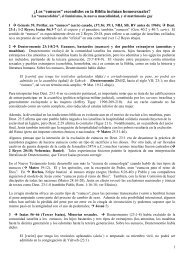Zephaniah - Fundación Otras Ovejas de Argentina
Zephaniah - Fundación Otras Ovejas de Argentina
Zephaniah - Fundación Otras Ovejas de Argentina
You also want an ePaper? Increase the reach of your titles
YUMPU automatically turns print PDFs into web optimized ePapers that Google loves.
Zeph. 1:2-3 refers to the creation, expulsion from E<strong>de</strong>n and the flood in Gen. 1-11;<br />
Zeph. 2 refers to the Table of Nations in Gen. 10;<br />
Zeph. 1-3 contains various allusions to Deut.<br />
But above all, <strong>Zephaniah</strong> utilizes expressions of other prophets: see 1:2-3, 7, 12-13, 15, 18;<br />
2:2-3, 8-9, 14-15; 3:3-4,10-11, 14, 17, 19 (BJ with the marginal references); also 1:9 with<br />
Amos 3:10; 2:10 with Jer 48:29. 16<br />
The use of <strong>Zephaniah</strong> in the NT focuses on the apocalyptic texts:<br />
Zeph. 1:3 à Mat 13:41<br />
Zeph. 1:14-18 à Apoc 6:17<br />
Zeph. 3:8 à Apoc 16:1<br />
Zeph. 3:13 à Apoc 14:5<br />
The Benedictine hymn from the 12 th Century, Dies irae, dies illa, revised by the Franciscan<br />
Tomás <strong>de</strong> Celano (13 th Century), based on <strong>Zephaniah</strong> 1:14-16, formed a part of the Missale<br />
Romanum for funerals and has been translated into many languages (see Trinity Hymnal<br />
242). Christian painting has many examples of <strong>Zephaniah</strong> scrutinizing the city of Jerusalem<br />
with his lamp (see Zeph. 1:12, where it is God himself who inspects the city, and with<br />
lamps, plural).<br />
Charismatic Chorus/Pentacostal (<strong>Zephaniah</strong> 3:17, RV):<br />
The Lord your God is in your midst – a warrior who gives victory;<br />
He will rejoice over you with gladness – he will renew you in his love;<br />
He will exult over you with loud singing.<br />
Note: : Puesto que “Jehová” repite un error medieval en cuanto al nombre sagrado <strong>de</strong> Dios,<br />
es mejor ser fiel al texto Hebreo; “Yahvéh tu Dios está en medio <strong>de</strong> ti....” (O “El Señor”).<br />
As to the rest, it is notable how often Pentecostal/charismatic spirituality, arising from the<br />
marginalized circles of society and characterized by great sexual repression, focus on the<br />
most erotic texts of the Bible, as in this case. Since the text of Zeph 3:17 celebrates the<br />
conjugal union of Yahweh, the Liberating God, with the city (literally “daughter”, 3:14) of<br />
Zion/Jerusalem, previously abandoned for being unfaithful (The Exile, provoked by<br />
oppression and idolatry), but now reunited again in the Holy Land. Thus, <strong>Zephaniah</strong> 3:17,<br />
like à Song of Songs, shows a very positive activity relative to sexual pleasure in the<br />
context of justice, authenticity and mutual love.<br />
Ethiopia/Cush and <strong>Zephaniah</strong>’s Possible African Origins :<br />
Rice, Gene (1979). “The African Roots of the Prophet <strong>Zephaniah</strong>”. Journal of Religious<br />
Thoughts 36, 21-31.
















